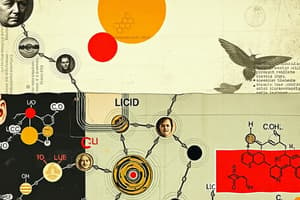Podcast
Questions and Answers
What are biochemical pathways?
What are biochemical pathways?
- Biological catalysts that speed up reactions
- The study of proteins and nucleic acids
- The breakdown and utilization of food by the body
- Chemical reactions transforming raw materials into useful products (correct)
How do enzymes function in biochemical pathways?
How do enzymes function in biochemical pathways?
- By regulating the body's metabolic rate
- By breaking down food for energy
- By serving as raw materials for reactions
- By speeding up reactions without being consumed (correct)
Which factor can influence enzyme activity?
Which factor can influence enzyme activity?
- Temperature (correct)
- The color of the substrate
- Overall body size
- The breakdown of lipids
What is the primary role of enzymes in nutrient metabolism?
What is the primary role of enzymes in nutrient metabolism?
Which of the following is NOT a key component of biochemistry?
Which of the following is NOT a key component of biochemistry?
Why is understanding biochemical pathways crucial for living organisms?
Why is understanding biochemical pathways crucial for living organisms?
Which molecule is known as the primary energy currency of cells?
Which molecule is known as the primary energy currency of cells?
What role do micronutrients like vitamins and minerals play in metabolism?
What role do micronutrients like vitamins and minerals play in metabolism?
In a biochemical context, what is the role of a Technical Writer?
In a biochemical context, what is the role of a Technical Writer?
What is the main responsibility of a Biostatistician in the field of biochemistry?
What is the main responsibility of a Biostatistician in the field of biochemistry?
What does a Research Assistant typically do in a lab setting?
What does a Research Assistant typically do in a lab setting?
What type of projects would a Clinical Research Associate be involved in?
What type of projects would a Clinical Research Associate be involved in?
Flashcards are hidden until you start studying
Study Notes
Biochemistry: An Overview
Biochemistry is a branch of the life sciences that deals with the chemical processes within and relating to living organisms. It involves studying the structure, composition, function, and interactions of molecules responsible for the vital activities of cells, tissues, and organs. Key components of biochemistry include the study of proteins, nucleic acids, lipids, carbohydrates, and various other organic compounds that make up living matter.
Biochemical Pathways
Biochemical pathways are sequences of chemical reactions within cells that transform raw materials into useful products. They are regulated by enzymes and serve diverse functions such as energy generation, nutrient metabolism, detoxification, and immune responses. Understanding these pathways is crucial for understanding how living organisms maintain homeostasis and respond to environmental changes.
Enzymes
Enzymes are biological catalysts that speed up chemical reactions without being consumed in the process. They play a pivotal role in biochemical pathways by lowering the activation energy required for reactions to occur. Enzymes are classified based on the reactions they catalyze, and their activity can be influenced by various factors such as temperature, pH, and substrate concentration.
Nutrient Metabolism
Nutrient metabolism refers to the breakdown and utilization of food by the body for energy production, cell maintenance, and growth. Macronutrients like carbohydrates, proteins, and fats are broken down into smaller molecules, which are then used to produce ATP (adenosine triphosphate), the primary energy currency of cells. Micronutrients, such as vitamins and minerals, act as cofactors or regulators in various metabolic reactions, ensuring proper nutrient absorption and utilization.
Career Opportunities in Biochemistry
There are numerous career paths available for individuals with a background in biochemistry. These include roles in academia, industry, healthcare, and government agencies. Some common jobs include:
- Research Assistant: Working in a lab setting to contribute to ongoing research projects, often involving new genetic tests, genetic engineering, or the development of drugs or drug protocols.
- Clinical Research Associate: Designing and implementing clinical research projects, such as new drug protocols or the use of viruses for gene therapy. Travel may be required to visit field sites where clinical trials are conducted.
- Technical Writer: Developing operating procedures, laboratory manuals, clinical protocols, and other documentation required for the production of goods or services in a biochemical context. May also involve editing technical reports for internal or external audiences.
- Biochemical Development Engineer: Scaling up laboratory processes to full production, determining instrumentation needs, and addressing issues related to quality control and efficiency.
- Biostatistician: Designing research studies, collecting and analyzing data, and providing expertise on experimental design, sample sizes, and other statistical considerations.
Studying That Suits You
Use AI to generate personalized quizzes and flashcards to suit your learning preferences.




